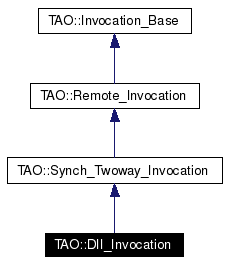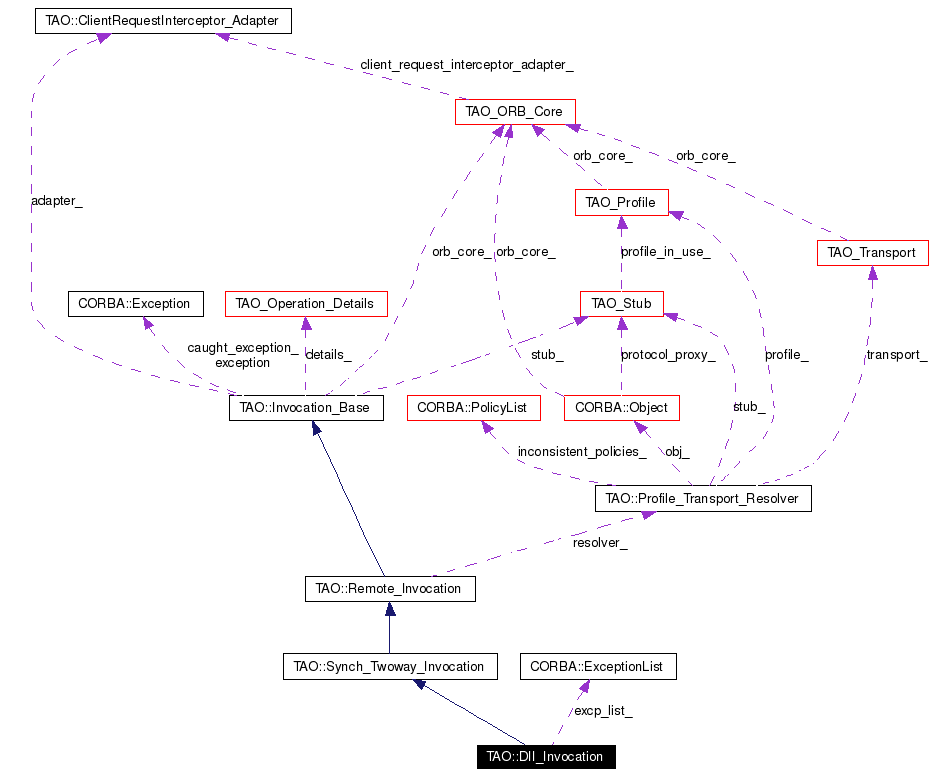
#include <DII_Invocation.h>
Inheritance diagram for TAO::DII_Invocation:


Public Member Functions | |
| DII_Invocation (CORBA::Object_ptr otarget, Profile_Transport_Resolver &resolver, TAO_Operation_Details &detail, CORBA::ExceptionList *excp, CORBA::Request_ptr req, bool response_expected=true) | |
| virtual Dynamic::ParameterList * | arguments () throw (CORBA::SystemException) |
| Invocation_Status | remote_invocation (ACE_Time_Value *max_wait_time) throw (CORBA::Exception) |
| virtual Invocation_Status | handle_user_exception (TAO_InputCDR &cdr) throw (CORBA::Exception) |
Private Attributes | |
| CORBA::ExceptionList * | excp_list_ |
| CORBA::Request_ptr | host_ |
| Back pointer to the DII request that created us. | |
Friends | |
| class | DII_Invocation_Adapter |
|
||||||||||||||||||||||||||||
|
Definition at line 34 of file DII_Invocation.cpp.
00040 : Synch_Twoway_Invocation (otarget, 00041 resolver, 00042 detail, 00043 response_expected) 00044 , excp_list_ (excp) 00045 , host_ (req) 00046 { 00047 } |
|
|
Definition at line 51 of file DII_Invocation.cpp. References ACE_CHECK_RETURN, ACE_ENV_SINGLE_ARG_PARAMETER, and TAO::NVList_Argument::interceptor_paramlist().
00053 {
00054 // Generate the argument list on demand.
00055 Dynamic::ParameterList *parameter_list =
00056 TAO_RequestInfo_Util::make_parameter_list (ACE_ENV_SINGLE_ARG_PARAMETER);
00057 ACE_CHECK_RETURN (0);
00058
00059 Dynamic::ParameterList_var safe_parameter_list = parameter_list;
00060
00061 TAO::Argument **args =
00062 this->details_.args ();
00063
00064 if (this->details_.args_num () > 1)
00065 {
00066 // Take the second argument since the first is a return value.
00067 TAO::NVList_Argument *tmp_arg =
00068 dynamic_cast <TAO::NVList_Argument*> (args[1]);
00069
00070 tmp_arg->interceptor_paramlist (parameter_list);
00071 }
00072
00073 return safe_parameter_list._retn ();
00074 }
|
|
|
Reimplemented from TAO::Synch_Twoway_Invocation. Definition at line 87 of file DII_Invocation.cpp. References ACE_CHECK_RETURN, ACE_DEBUG, ACE_ENV_ARG_PARAMETER, ACE_ENV_SINGLE_ARG_PARAMETER, ACE_NEW_RETURN, ACE_THROW_RETURN, LM_DEBUG, ACE_InputCDR::read_string(), TAO::Reply_Guard::set_status(), ACE_OS::strcmp(), TAO_debug_level, TAO::TAO_INVOKE_FAILURE, and TAO::TAO_INVOKE_USER_EXCEPTION.
00090 {
00091 Reply_Guard mon (this,
00092 TAO_INVOKE_FAILURE);
00093
00094 if (TAO_debug_level > 3)
00095 {
00096 ACE_DEBUG ((LM_DEBUG,
00097 "TAO (%P|%t) - DII_Invocation::"
00098 "handle_user_exception \n"));
00099 }
00100
00101 // Match the exception interface repository id with the
00102 // exception in the exception list.
00103 // This is important to decode the exception.
00104 CORBA::String_var buf;
00105
00106 TAO_InputCDR tmp_stream (cdr,
00107 cdr.start ()->length (),
00108 0);
00109
00110 // Pull the exception ID out of the marshaling buffer.
00111 if (tmp_stream.read_string (buf.inout ()) == 0)
00112 {
00113 ACE_THROW_RETURN (CORBA::MARSHAL (TAO::VMCID,
00114 CORBA::COMPLETED_YES),
00115 TAO_INVOKE_FAILURE);
00116 }
00117
00118 for (CORBA::ULong i = 0;
00119 this->excp_list_ != 0 && i < this->excp_list_->count ();
00120 i++)
00121 {
00122 CORBA::TypeCode_var tc =
00123 this->excp_list_->item (i
00124 ACE_ENV_ARG_PARAMETER);
00125 ACE_CHECK_RETURN (TAO_INVOKE_FAILURE);
00126
00127 const char *xid = tc->id (ACE_ENV_SINGLE_ARG_PARAMETER);
00128 ACE_CHECK_RETURN (TAO_INVOKE_FAILURE);
00129
00130 if (ACE_OS::strcmp (buf.in (), xid) != 0)
00131 {
00132 continue;
00133 }
00134
00135 CORBA::Any any;
00136 TAO::Unknown_IDL_Type *unk = 0;
00137 ACE_NEW_RETURN (unk,
00138 TAO::Unknown_IDL_Type (
00139 tc.in (),
00140 cdr
00141 ),
00142 TAO_INVOKE_FAILURE);
00143
00144 any.replace (unk);
00145
00146 mon.set_status (TAO_INVOKE_USER_EXCEPTION);
00147
00148 ACE_THROW_RETURN (CORBA::UnknownUserException (any),
00149 TAO_INVOKE_USER_EXCEPTION);
00150 }
00151
00152 // If we couldn't find the right exception, report it as
00153 // CORBA::UNKNOWN.
00154
00155 // But first, save the user exception in case we
00156 // are being used in a TAO gateway.
00157 this->host_->raw_user_exception (cdr);
00158
00159
00160 mon.set_status (TAO_INVOKE_USER_EXCEPTION);
00161
00162 // @@ It would seem that if the remote exception is a
00163 // UserException we can assume that the request was
00164 // completed.
00165 ACE_THROW_RETURN (CORBA::UNKNOWN (TAO::VMCID,
00166 CORBA::COMPLETED_YES),
00167 TAO_INVOKE_USER_EXCEPTION);
00168
00169 }
|
|
|
Definition at line 78 of file DII_Invocation.cpp. References ACE_ENV_ARG_PARAMETER. Referenced by TAO::DII_Invocation_Adapter::invoke_twoway().
00081 {
00082 return Synch_Twoway_Invocation::remote_twoway (max_wait_time
00083 ACE_ENV_ARG_PARAMETER);
00084 }
|
|
|
Definition at line 48 of file DII_Invocation.h. |
|
|
Definition at line 75 of file DII_Invocation.h. |
|
|
Back pointer to the DII request that created us.
Definition at line 78 of file DII_Invocation.h. |
 1.3.6
1.3.6